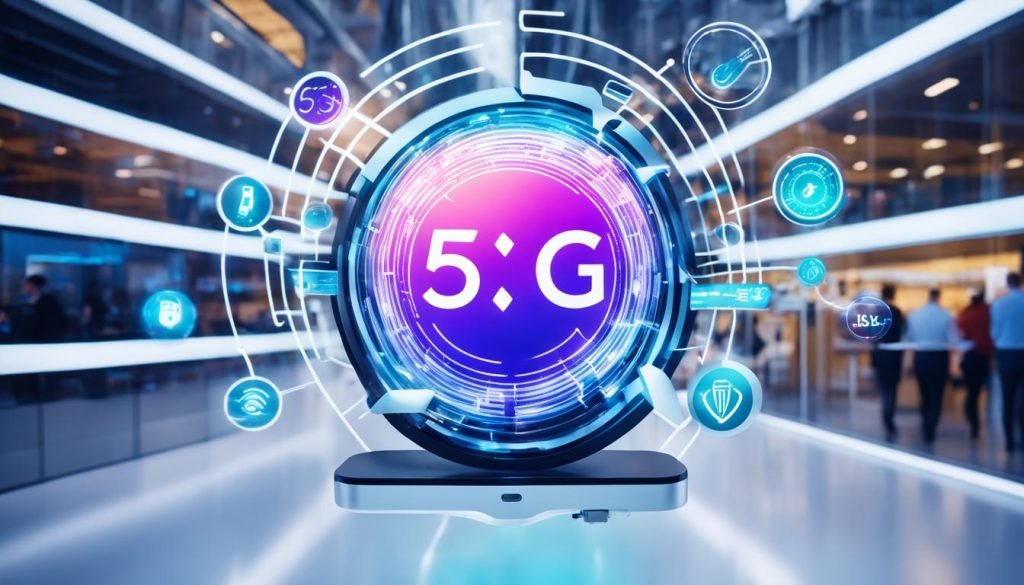5G technology has quickly become the talk of the town, with its promise of faster speeds, greater capacity, and enhanced connectivity. As we embrace the digital age, the demand for seamless and efficient wireless communication continues to grow. That’s where 5G comes in. This fifth generation of mobile networks is set to revolutionize the way we connect and interact with the world around us.
With 5G, we can expect lightning-fast download and upload speeds, enabling seamless streaming, gaming, and browsing experiences. But it doesn’t stop there. 5G technology also offers lower latency, paving the way for real-time applications like autonomous vehicles, remote surgeries, and smart city initiatives. The possibilities for innovation and transformation are endless.
Key Takeaways:
- 5G technology offers faster speeds, greater capacity, and enhanced connectivity.
- Lower latency enables real-time applications like autonomous vehicles and remote surgeries.
- 5G has the potential to revolutionize industries such as healthcare, manufacturing, and entertainment.
- The adoption of 5G is projected to increase globally, with Asia Pacific leading the industry.
- As 5G continues to evolve, challenges such as spectrum limitations need to be addressed.
The Market Value of 5G
The Asia Pacific region, particularly China and Japan, leads the 5G industry in terms of market value. China holds a dominant position with a significant revenue share, and the market for 5G technology in China is projected to be worth billions of dollars. This expansion is reflective of the global trends in 5G adoption, with major service providers like Saudi Telecom Company, Rakuten Mobile Inc., AT&T, Vodafone Group, and China Mobile Ltd leading the way in rolling out 5G services. The market value of 5G is set to increase significantly, underpinning the technology’s role in shaping future connectivity and digital interactions worldwide.
To understand the massive growth of the 5G market, let’s take a closer look at some key players:
| Service Provider | Market Presence |
|---|---|
| Saudi Telecom Company | Serving millions of customers in the Middle East, offering 5G technology solutions with rapid adoption rates. |
| Rakuten Mobile Inc. | A leading Japanese mobile network operator revolutionizing the 5G market with its advanced infrastructure and services. |
| AT&T | Being one of the largest telecom companies globally, AT&T plays a significant role in the widespread deployment of 5G networks across the United States. |
| Vodafone Group | Operating in various regions worldwide, Vodafone Group is expanding its 5G services to meet the increasing demand for high-speed connectivity. |
| China Mobile Ltd | With a massive subscriber base and a strong market presence, China Mobile Ltd drives the growth of the 5G industry in China, leading to substantial market value. |
These service providers, along with others, are investing heavily in 5G technology research and development, pushing the boundaries of innovation and unlocking new possibilities. With the market value of 5G on the rise, businesses and consumers alike can expect a transformative digital landscape, revolutionizing the way we connect, communicate, and interact.
Benefits and Use Cases of 5G
As the latest advancements in 5G technology continue to shape the future, its impact goes beyond faster browsing speeds. 5G enables seamless connectivity, reduced latency, and enhances user experiences across various domains. Let’s explore some of the compelling use cases for this transformative technology.
Smart Cities:
In the realm of smart cities, 5G’s high-speed connectivity and low latency capabilities enable real-time data processing. This facilitates efficient traffic control, public safety enhancements, and effective energy management. With 5G, urban centers can leverage the power of instantaneous communication to optimize day-to-day operations, making cities safer, greener, and more sustainable.
Autonomous Vehicles:
The future of transportation relies heavily on autonomous vehicles, and 5G plays a crucial role in their development. With its ultra-low latency, 5G enables seamless communication between vehicles, improving safety and efficiency on the roads. The use of 5G technology helps enable real-time data-sharing among vehicles, enhancing their ability to navigate and respond to complex traffic situations.
Immersive AR/VR Experiences:
AR and VR experiences are taking entertainment and interactive applications to new heights. By leveraging 5G’s high bandwidth and reduced latency, users can enjoy more realistic and engaging virtual environments. From immersive gaming experiences to virtual tours and remote collaboration, 5G’s capabilities are revolutionizing the way we engage with digital content.
Other industries like healthcare and manufacturing are also embracing the potential of 5G. In healthcare, 5G allows for real-time telemedicine, enabling doctors to remotely diagnose and treat patients. In manufacturing, real-time machine monitoring and predictive maintenance are empowered by 5G, optimizing production processes and reducing downtime.
As innovation continues to push the boundaries of 5G technology, its impact across industries will continue to expand. The future of 5G holds immense potential to redefine connectivity and shape our digital experiences in profound ways.

Stay tuned for the next section as we delve deeper into the applications of 5G across various industries.
5G Across Various Industries
5G technology is poised to revolutionize a wide range of industries, ushering in a new era of connectivity and possibilities. From healthcare to manufacturing, entertainment to information technology, and telecommunications, the impact of 5G is being felt across the board.
Healthcare
In the healthcare industry, 5G is transforming patient care. With its lightning-fast speed and low latency, 5G enables technologies like remote surgeries, allowing doctors to perform procedures from a distance and broaden access to specialized care. Real-time patient monitoring is also made possible, ensuring that patients receive timely and accurate medical attention.
Manufacturing
For the manufacturing sector, 5G brings real-time machine monitoring and predictive maintenance to the forefront. By harnessing the power of 5G, manufacturers can optimize their operations, reduce downtime, and improve overall efficiency. With faster and more reliable connectivity, machines can communicate seamlessly with each other, leading to improved productivity and cost savings.
Entertainment
In the entertainment industry, 5G is revolutionizing content streaming. With its high bandwidth and reduced latency, 5G enables high-quality streaming of video and audio content, creating immersive and seamless entertainment experiences. From streaming services to gaming platforms, 5G is unlocking new avenues for creative expression and user engagement.
Information Technology
Information technology (IT) is another industry that stands to benefit greatly from 5G technology. With faster data transfers, 5G enables more efficient cloud computing, enabling businesses to leverage the power of the cloud for storage, processing, and collaboration. Developers can work remotely and seamlessly, tapping into the full potential of cloud-based technologies.
Telecommunications
Telecommunications companies are at the forefront of 5G adoption, improving network services and meeting the growing demand for high-speed internet. With 5G, users can expect faster browsing speeds, smoother video calls, and enhanced connectivity. The widespread adoption of 5G is reshaping the telecommunications industry and paving the way for future innovations.
| Industry | 5G Applications |
|---|---|
| Healthcare | Remote surgeries, real-time patient monitoring |
| Manufacturing | Real-time machine monitoring, predictive maintenance |
| Entertainment | Immersive content streaming, enhanced gaming experiences |
| Information Technology | Faster data transfers for cloud computing, remote development processes |
| Telecommunications | Improved network services, high-speed internet connectivity |
The widespread adoption of 5G across various industries is reshaping operations, enhancing efficiency, and improving user experiences. As 5G technology continues to advance, its impact will be felt across the globe, driving innovation and transforming the way we live and work.

Conclusion
5G technology continues to advance, driving major developments and trends in the industry. The latest advancements in 5G technology, such as increased speed, greater capacity, and lower latency, have positioned it as a transformative force in connectivity and digital interactions. As a result, 5G is poised to reshape various industries and revolutionize daily life.
The market value of 5G is projected to skyrocket, thanks to its global adoption and support from leading service providers. This growth highlights the significant potential and demand for 5G network upgrades and services. From smart cities to autonomous vehicles and immersive AR/VR experiences, the use cases for 5G are diverse and indicative of its ability to drive innovation across different sectors.
While challenges remain, including spectrum limitations and cost implications, the future of 5G technology looks promising. Ongoing research and constant updates in 5G technology ensure its continuous evolution, refining its benefits and addressing existing hurdles. As a pivotal technology in the modern digital landscape, 5G has the power to enhance operational capabilities and elevate user experiences, making it an integral part of our connected future.


